So, you have decided to jump into home dairying and that raw milk is a priority for your family. The BIG Question is “How exactly do you acquire it?”.
If you are like us, purchasing raw milk for human consumption is illegal in our state. In fact, Wyoming has just barely started officially “allowing” cowshare or goatshare programs. So unless we want to drive out of state, we are out of luck.
These reasons combined with the fact that we are crazy do-it-yourself people prompted us to look into owning our own dairy animals at the beginning of our homestead journey. Goats were our gateway animal into the world of home dairying, and I was a proud goat milker for several years before finally purchasing our first milk cow.
However, even though my goats have been dried up for a while, and we are exclusively milking our cow, I’m still very much pro-goat. There are definitely advantages to each animal–and I’m highlighting the pros and cons of owning a home dairy cow vs. goat for you today.
Home Dairy Cow vs. Goat Pros and Cons
Deciding to add livestock to your homestead is no small decision. You should do your homework to figure out what addition is right for your situation and How to Pick the Best Livestock for Your Homestead. Choosing your ideal dairy animal is no different. Which dairy animal you choose will depend on what you are looking to add to your homestead and home dairy.

Home Dairy Goat Pros:
Cost: Dairy goats are generally much cheaper to purchase than a milk cow. Goat price tags vary greatly, but expect to pay anywhere from $50-$300 for a starter goat–depending on the age, breed, and whether or not it is registered.
Less Feed: Goats consume far less hay than a full-sized milk cow. Heck, even when our goat herd was at its largest (10-12 head), they still ate far less than our cows.
Space: It’s kind of obvious, but a couple of goats will take a whole lot less pasture space, and less space in your pens/barns.
Intimidation Factor: Because they are so much smaller, goats are a better choice if you’ve never worked around large animals before. If the largest pet you’ve had thus far is a goldfish, sitting underneath a 1200-pound cow for the first time so you can grab a hold of its udder can be a bit nerve-wracking.
They Give Less Milk: If you have a small family, or don’t have the time to deal with massive quantities of milk, then a goat is probably perfect for you.
The Milk Tastes Darn Good: Really. Fresh goat milk that has been handled correctly takes just like cow milk to me. Contrary to popular belief, goat milk doesn’t have to taste like a nasty ol’ buck.
Breeding Season Can be Easier: In order to get milk, you need to breed your goats so they can have babies. It depends on the area, but I always had an easier time finding a buck to rent than trying to hunt down a bull for our cow.
Home Dairy Goat Cons:
Fencing: In order to keep a goat in a fence, it needs to pretty much be watertight…. And even then, they will still probably get out. This was the #1 factor in us reducing the size of our goat herd. There are definitely ways to get around this issue, but it takes a bit of creativity and usually some electric fence.
They Give Less Milk: If you have a large family, or are itching to go nuts with home cheesemaking, you’ll need to milk several goats (at least) in order to get enough milk.
It’s Tough to Get Cream: Since goat’s milk is naturally homogenized, very little cream rises to the top. So, if you are having visions of making homemade butter or whipped cream, you’ll need to invest in some sort of mechanical cream separator. I’m a big fan of cream, so this part of keeping goats always bummed me out.
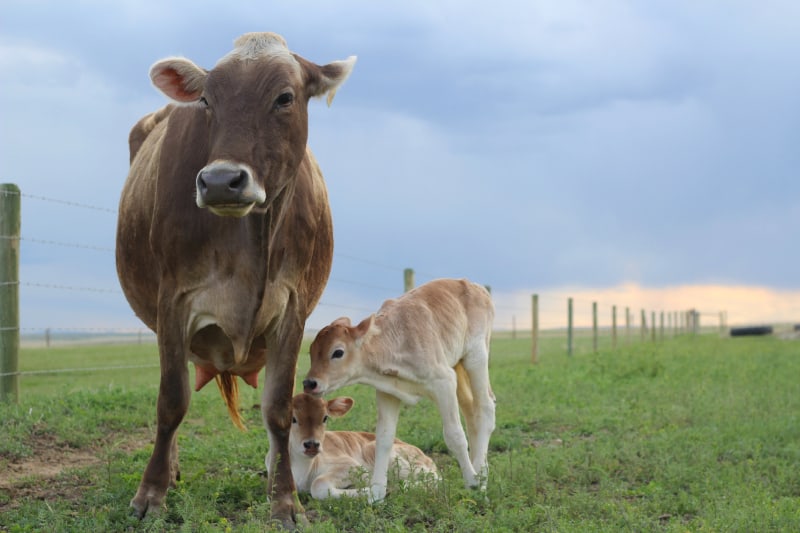
Home Dairy Cow Pros:
Fencing: If you have a basic barbed wire or wooden fence, your cow will probably stay inside–no problem.
You’ll be Swimming in Milk: For real… Even when I’m just milking Oakley once per day, I still get around 2 gallons per milking. That’s enough to make all the cheese, ice cream, butter, and yogurt that my little heart desires.
You can Feed Other Animals: I love feeding our pigs, chickens, and dogs our excess milk–and there is usually plenty to go around.
CREAM: Need I say more? The first time I got a 5-inch cream line in my milk jar, I did a major happy dance. 🙂
The Milk Tastes Darn Good: Yep– I just love milk. Goat milk, cow milk… It’s all good!
Extra Calves Can be Beef for your Freezer: Not to say that you can’t eat goat meat, but we’ve found that the dairy calves that we’ve put in the freezer have been excellent.
Home Dairy Cow Cons:
Transportation: Unless you have some really generous friends with trucks/stock trailers, you’ll need some sort of truck/trailer to haul your cattle. In contrast, you can usually haul goats in a minivan… Just a thought.
Cost: As I mentioned above, purchasing a home dairy cow vs. goat can be quite costly. It will usually set you back $1000-$3000. It’s an investment for sure.
Feed: Cows eat more than a goat. Period.
Space: They require a larger amount of pasture space. One cow usually requires around 2-5 acres of pasture, depending on where you live. And even though we have 60+ acres of pasture on our homestead, we still remove our animals during the pasture for part of the winter/spring to give them a rest. This means we feed hay for a portion of the year–and that can be expensive.
Breeding: Sometimes it takes a bit of effort to find a bull to borrow when it comes time to breed your cow back. Artificial insemination can be a good option–as long as you can find semen and someone who knows how to AI.
You’ll Be Swimming in Milk: The first few days you are swimming in milk it seems great and really fun. Then your refrigerator is jam-packed full of milk, you have made all the yogurt and milk kefir your family can stomach. and have no time to devote to cheesemaking, it can easily become overwhelming. There are definitely ways to cope with milk overload, but be prepared for it–it’s inevitable.

Dairy Cow vs. Goat Which is Right For You?
If you are a beginning homesteader, I wholeheartedly recommend starting out with a couple of goats. They are a wonderful introduction to the world of home dairying, and you don’t have to shell out a bunch of cash to get started. (Just make sure you do have that water-tight fence…)
When you are ready for the next step (or to step up your cheesemaking game), a cow just might be the perfect addition. I’m a fan of both goats AND cows. They both have their benefit and their downfalls, but both have made my personal homesteading experience a whole lot more exciting.
Nothing quite compares to the first time you take a sip of fresh milk from your very own home dairy cow or goat. It will make all the sweat, money, and time spent fencing worth it.
For more information on dairy goats vs. milk cows listen to the Old Fashioned On Purpose podcast episode 16. Dairy Goats vs. Milk Cows: Which is Best?
Or watch my video on this topic here:
More About Home Dairy:
- Caring for a Cow and Her Calf After Delivery
- 9 Tips for Training a Goat on the Milking Stand
- How to Separate Cream from Milk
- How to Train a Heifer to Become a Family Milk Cow

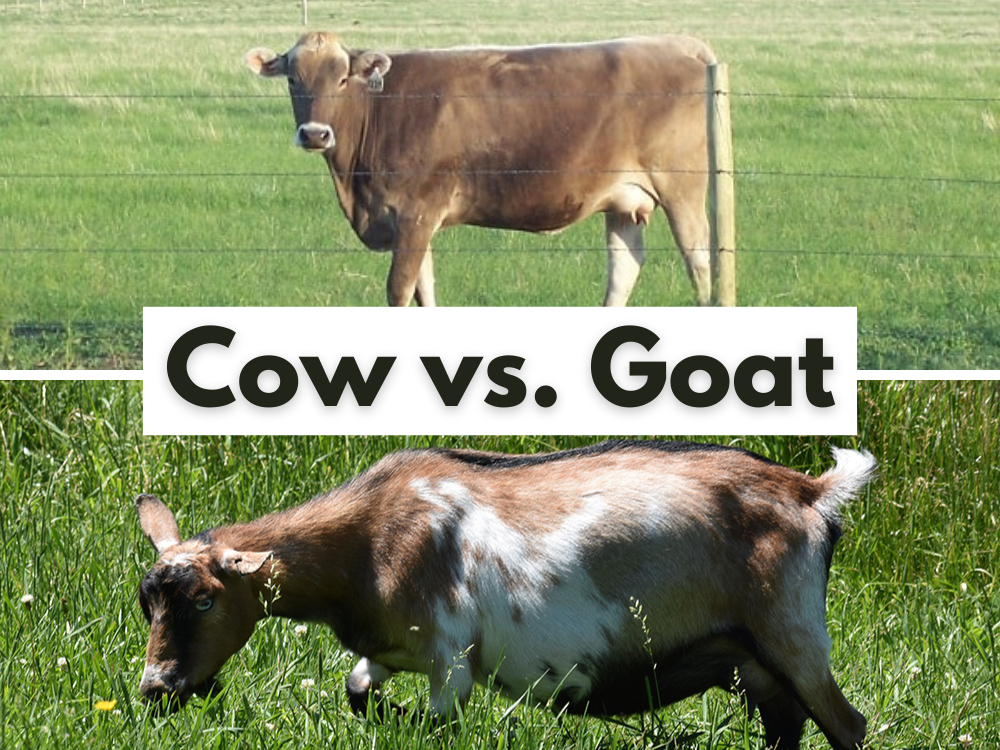

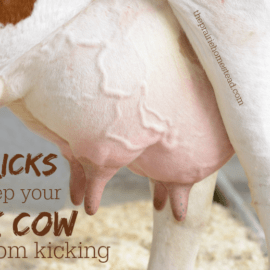
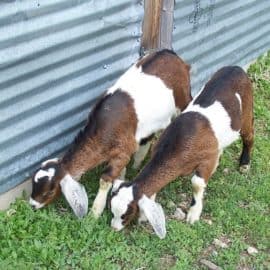
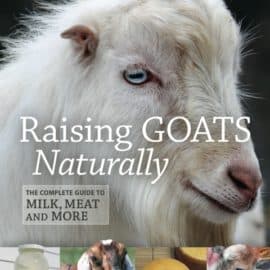
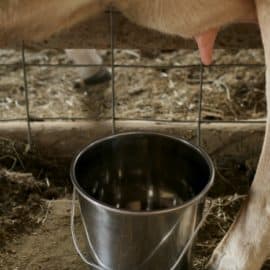
Hm, some friends of mine have goats, and I can say the milk tastes VERY different to me. The one time I tried it, I didn't like it … it seemed almost salty. However, I do love goat cheese! In that context the different taste is a bonus.
I HATED goat’s milk… tried it many times and found out (in my case) it had nothing to do with what the animal was being fed… it was the breed. Once I tasted oberhasli milk, after decades of people saying, “Here, try my goat milk, you’ll love it” and still finding it intolerable… well, the oberhaslis taste FANTASTIC with no goat aftertastes. And now my barn is full of beautiful “buckskin” colored deer-like oberhaslis. People who visit and have a taste of our milk say they love it and can’t tell a difference from cow milk. One person insisted it was much better, in fact.
P.S. I did a time test and kept a jar of our oberhasli milk in the fridge… took the lid off every day as if we were drinking it and put it back… one full week later still tasted fresh and had not acquired that unwanted (by me) goat flavor. I do taste the goat if I make cheese, though… still very mild… but not if it’s just milk.
This is good to know, because growing up I remember not being able to stand the smell or taste of goat…so I never wanted to have it. We had a dairy cow back then, but it isn’t possible for us now because of where we live and I have been trying to find a solution. Actually finding a goat that makes milk that doesn’t smell/taste like an old billy goat is good news. Though I would have to try it first…just in case.
I have not had any problems with goaty milk taste as long as the milk is handled properly. Milk test on my Nigerians has been about 7% butterfat early in lactation and can go up from there. Makes for smooth tasting milk and great cheese yields. Probably why Nigerians moved from the endangered list to third most popular breed. We love them. They are easily fenced with field fencing so I am not sure why so many people having trouble keeping their goats in. The only time they get out is when we leave the gate open. We only have 5 acres on the Wyoming plains and on a good year this is plenty. I am also reminded of why I love goats as just today they are eating the spent vegetable garden. They also eat both weeds and grass in the pasture. One of our most loved ways to have goats milk- fresh ice cream using the whole milk. No need to add cream!
I agree! Nigerians have such high butter fat! Also, you are right…easy to fence. We use hog panels because they are rigid already and so easy to install. The sweetness of the milk is superb! Also, they are small and sweet little animals. We let tem run around the yard, too. ?
I kept Oberhaslis, and they give the sweetest milk of all breeds of goat. They are milk tempered and medium sized.
Most bucks are gentle if they are hand raised.
Definitely the best choice if you want sweet milk and good temperments.
We've bought fresh goat milk and it tastes the same as cow's milk the first few days, but after maybe 2 days, the taste starts to deteroirate (IMO).
Good luck with your goats!
I think it depends on the goat and the person!
I am curious to try milk from some goats besides our own and see if I can tell a difference. And of course, every person's taste buds are a bit different.
But biggest thing that sold me on goats was that my very very picky husband couldn't tell much of a difference in the milk. That is definitely saying something! 😉
I got a cream line on my Tuatha's milk after 3 days…usually about a quarter of the jar. You don't have to rebreed every year if you milk them through.
Goat milk taste issues are usually poor milk handling practices and or health/nutrition issues. Salty milk is an indicator of mastitis.
There can be variations in taste from goat to goat and breed to breed. That being said, the most important thing is sanitation in milk handling (assuming your does aren't out there eating wild onions or something. But of course, a cow can do that too!) Years ago, before the internet, we had milk goats and not that I didn't try to be clean in my milk handling, but I surely didn't know what I know now about it. Our goat milk tastes wonderful All The Time now.
Yes, milk handling does play a HUGE role in the taste of the milk! I am very careful with ours and perhaps that is why I haven't had taste issues. I have never thought it tasted salty either.
Jenny- I can get a small cream line on my milk, but not enough to really bother with. Have you ever tried to make goat butter?
I wonder if nigerian dwarf goats would produce cream? I really appreciated this post, thanks so much! Found it through gnowfglins. I am really hoping to have our own dairy goats in a few years and just love reading about happy goat owners :}
Gypsyforest-
I think that Nigerians do produce cream- I have heard people say that if you let it sit for several days it is easier to get the cream to rise to the top. I would still love to see how an actual cream separator works, though!!
I'm glad you enjoyed the post- goats are so much fun!
Nigerians do produce a cream line after a couple days. Also with a gallon of milk though a seperator you get about a pint of cream. Hope this helps.
I've used raw goat milk for the past year and a half. I get it from a small farm with about 70 goats that's just 22 miles from my home. It is still legal here, as long as I pick it up at the farm.
It's not quite as creamy as cow milk, but since it's got amost no casien, I prefer it. I havn't consumed store bought milk in at least three years.
I have a separator, but it is a lot of work to use (it is a hand-cranked model), and has an awful lot of pieces to wash. The cream I got was fine to use fresh, but the butter I made with it wasn’t very tasty. So now I share a Jersey cow with a friend, and we have lots of wonderful cream, and homemade raw butter. Commercial raw milk is legal in California, but they keep trying to pass legislation that will make it impossible for the producers to stay in business. Recently the authorities have started going after herd share groups. We have been drinking our own raw milk for 14 years. We stagger breeding dates, and/or milk a couple of does through without kidding, so we have milk all year. I’ve done blind taste tests (fresh raw goat milk vs. store-bought pasteurized cow milk), with dozens of people who claimed they hated goat milk, and I’ve only found one who could reliably tell which was which (a dairy farmer’s wife, who raised goats). If asked which they preferred, almost all chose the raw goat milk. I have tasted the commercial, pasteurized milk, and it was awful! I think they have lots of Toggenburgs in their herd, as they usually have strong flavored milk. We have Alpines and Oberhaslis.
We’ve had a milking cow for 3 yrs now, and a milking goat for about 2 months. Currently both are lactating. I love both, but have more of a love affair with the cow, as she’s been our sweetheart for so long. The ease of seperating milk is nicer for cows. Both make great cheese, but goat makes better fresh cheese than cow. We do make hard, waxed, aged cow cheese. The amount of feed a goat eats versus cow is better on the pocket. My husband grew up on raw cows milk, so he’ll always love it better, but doesn’t mind the cow milk. We have the goat so that when the cow is dry, the goat will still be producing milk for us!
Many of the stereotypes ‘goat’ people feel about cows are not true. Common ones we hear are “You have to wear steeltoe boots just to milk!” WRONG, if you have a mean cow, yes, but we’ve never been stepped on, and it’s not uncommon for me to be wearing a skirt and sandals in the summer. My husband always does, simply because he’s usually just got home from work where it’s required that he wears them.
“You have to milk them twice a day” Rarely have we milked twice a day, if ever. By the time the calf is off, the milk production has lowered and we still milk just once a day.
“You can’t continuely milk them like a goat, you have to rebreed every year” We’ve been milking our cow since June 2010. We’re still getting 6 litres a day, and we’re not pouring feed into her just to get that.
I love both animals, and enjoy milking both (okay, maybe goat more because it takes so little time versus a cow!!) We’re lucky to have enough space to play around with both animals!
thanks for this post! we are thinking about getting a couple of goats and it’s nice to see what all goes into it. so many things to think about!
I am debating what breed of goat to get for the same reason, I’d like to have some cream for butter? I hear nubians have the most fat content – which might make it more useful to make some butter with? Anyone know what goat breed is best for that?
Nigerians have a higher butterfat content but don’t produce as much milk.
I have read that the reason goat cream separates so slowly compared to cow milk is because it lacks a certain protein found in cow milk. However, you can get goat cream to separate quickly by adding a small amount of cow milk to the jar of goat milk. Apparently you can easily make goat butter this way 🙂
So glad I saw your post! I’m here in Wyoming also, and started researching cow/goat shares a couple years ago-They have to be legal here (found a bunch!) Anyways, thank you soooo much for the info! I was looking into cow shares originally, and have found ALOT of great stuff (and thankfully shares close by!) but lately, have been leaning towards goats. I know there’s a goat share just outside of town here, and I think I’m gonna see if I can do a taste test…Hoping it’s yummy!! Keep doing what you do- I can’t wait for God to bless us so I can get started! Thank you!!
So has no one become sick from the raw milk? I typed in safe goat milk and the CDC website poppep up with a bunch of warnings that, I am not gonna lie, scared the begezus out of me. Can you tell me how you handle your milk and how you make it safe for you family to drink? Or maybe I just haven’t gotten that far in the posts yet. Thanks, KarLynn
We’ve been drinking raw milk from our own animals for 3 years now– without a single sickness from it at all. (this holds true for my many, many friends that consume raw milk as well.) In fact, I truly believe it has made us healthier.
Now– it’s important to note– I would NOT drink raw milk from just *any* animal. They must be healthy, and the milk must be treated properly. If you were to go take a sip of milk from the bulk tank at a “regular” dairy, you would probably become ill.
Yes, the CDC/FDA hate raw milk… You will most definitely find a massive amount of warnings trying to scare you off. But, there is just as much positive info about raw milk out there. http://www.realmilk.com is a great place to start– but the resources are endless.
It’s really something that you must decide for your own family, but I will tell you that many, many families across the country are switching to raw and loving it! I personally will NEVER go back to pasteurized milk. And if we were ever unable to have our own dairy animals, I would do whatever it took to find a source of raw milk. It is something I’m very passionate about! I also believe that whole, unhomogenized milk is much better for you than the processed stuff at the store.
To make sure my milk is safe, I follow a fairly strict routine: our animals are grassfed and healthy. I always wipe down the udder and squirt the first couple sprays on the ground to flush out the teat. I only milk into a super clean, stainless steel bucket– never plastic. I bring the milk into the house immediately and filter it, then it goes right into the fridge.
I hope to do a raw milk post in the near future– but hope this info helps for now.
That is exactly how I milk! If someone is overly worried about pathogens in the milk, a simple 1 minute pasturization at 160 degrees on the stove might be a happy medium.
Thank you so much for the info. I kind of figured out that the CDC hates raw milk. I hope to make the transition in the future. I know it’s not something to rush into. I know someone in my area that has/raises goats and I hope to hear from them soon as to whether or not they drink the milk. I am very curious to try it! I will keep your blog close as I feel you and Stacy both have great things to share! Thank you! KarLynn
I drink both raw goat milk and raw cow milk – both bought from a local health food store. Personally I love both. The raw cow milk has a “grassier” taste to me. I’ve read goat milk is easier to digest and I tend to use goat milk more often.
I can’t wait to get a larger property where I can have a few goats and chickens. You stated that you need to have proximity to a male goat for breeding. Do you not recommend having a male of your own on the farm?
Thanks for this 101 course on goats – I learned a lot and will definitely bookmark this one…
You can definitely have a male goat of your own, however, sometimes they have the tendency to give the milk a strong taste. (The does always know when they are around the corner…) So for some folks, it’s easier to just borrow a buck. Glad you are enjoying the blog!
“Be diligent to know the state of your flocks, And attend to your herds; For riches are not forever, Nor does a crown endure to all generations. When the hay is removed, and the tender grass shows itself, And the herbs of the mountains are gathered in, The lambs will provide your clothing, And the goats the price of a field; You shall have enough goats’ milk for your food, For the food of your household, And the nourishment of your maidservants. Proverbs 27:23-27
God intended for us to have raw goats milk. Gods Word trumps what anybody else says. We should not let the FDA or the CDC scare us. I hope to own my own goats in the near future 🙂
I got a couple of Nigerian Dwarf goats that were just freshened. (in milk) Their milk is not “goaty” at all. It tastes like cow’s milk, but richer and sweeter. I milk them 2 times a day into sanitized jars that I store in the freezer. When I’m milking outside, I keep the main jar in a frozen cooler bag, and milk into a smaller pint jar, then transfer it to the bigger jar in the cooler when it’s full. Everyone in my family enjoys the milk, except for my son, who has a milk allergy… I made cheese and my next thing is to try and make soap. I do skim the cream off of the jars and collect it, and when I have enough, make butter. From the two goats combined, I get about a quart of milk per milking. Love the goats!!
We have had a pair of goats for a year now and we love the milk ! We have thought about getting a mini jersey in the next year or two. I would love to have the cream ! We love drinking our raw milk. I also make buttermilk (I’m Southern, and use it in my biscuits, and for marinating meat)and cheese. I would HATE to go back to buying milk at the store !
Oh, me too Millie! I think I’d cry if I had to go back to store milk. 😉
We raise Kiko goats and love the milk we get from them. I make cheese and butter from the milk. It is a process to get enough cream, but it can be done without a seperator. Try this link to learn how: http://www.youtube.com/watch?v=Ap76J9CYMHs She pasturises her milk, but I don’t.
Cool! I’ll have to check it out.
My husband bought me a “Henry Milker” for Christmas last year and I can’t sing its praises enough. I absolutely love it. It makes milking so easy. The milk has no chance of getting the goat hair, dirt or anything else in it and it is so clean. I now use my stainless steel milking bucket to carry my milking supplies in. Just do a search for “Henry Milker” and you will be able to find it. Cost around $100.00 for the system, but is well worth it. I have not had to throw out any milk because of my goat stepping into the bucket or lost any milk from the bucket being kicked over. All I use to strain the milk is a stainless steel fine mesh strainer.
I’ve never heard of it, but now I’m curious!
I did not check all of the remarks, but the one thing that I think about a lot with my goats, and I milked cows when I was a young teenager, and that is goats are much less intimidating to little children than a cow would be. We have lots of little people over to visit our farm, and everyone loves the little kids. BTW we got our first goats after we were 60 years, so your never too old. LOL
Let’s see goats vs. cow … well goats you can put up on a milking stand, cow you need to sit on a low stool. Goats have short tails, no getting slapped in the face as with a long cow tail. Goats take up less space. Goats won’t hurt as much if they step on your foot. Who is going to train cow to walk on halter, stand still for milking. Goats are easier to handle. Who is going to milk twice a day 24/7, think that is the person who decides cow vs. goats.
Does anyone have miniature milking cows? If so, let us know pros and cons.
I know this is an old post, but apparently, so few people seem to milk their mini cows & post about it! I have raised/bred miniature zebu since 2010. I love them! I milk for a period of time after they calve, freezing what i cant immediately drink. It’s the best of all worlds. My first 2 were bottle-fed, so very calm & friendly–got them when they were 4 months old. They make great pets, are full of personality & are great for smaller acreages. I currently am on 2 acres, and have 3 adult mini zebu (2 cows, 1 bull) & 2 calves (in addition to mini goats, chickens, & the ocassional pig).
Since I love milk, but don’t drink a lot of it, I only milk once per day, separating the calves overnight for morning milking. I was going to continue milking after the calves were weaned, but a broken wrist curtailed that. Even with milking once per day, I was getting a minimum of 16 oz from each cow. I could’ve gotten more, I’m sure, but I like to leave some for the calves. I feel confident in saying that if I was able to continue milking after the calves were weaned, I could get about 1/2 gal minimum from each cow, per day. There’s always next year though! Also, something most people are not aware of–-miniature zebu produce A2 type milk. This is also a God-send for lactose-intolerent folks! I raise miniture zebu and can attest to the great taste of their milk as well.
My husband is lactose intolerant and was never able to drink much cow’s milk. However, when living in a Ukrainian village several years we would get raw milk from a neighbor (sometimes still warm) and he had no problems with it (I would bring it to a par boil and it would last longer). I believe its the homogenization process that removes the ability for us to handle cow’s milk. Grew up drinking raw milk; mother scooped the cream off the time and ran the milk thru a separator/filter.
I agree! I think homogenization can cause issues too.
My husband and I are looking at getting a miniature cow – like a miniature Dexter for milk for our family – seems to be the best of both worlds! Would have to see if it turns out that way or if im just overly optimistic!
I’ve heard really good things about Dexters!
I was picturing me doing the “5 in creamline happy dance” …lol sounds so like what I need for the next step, currently have two Nigerian dwarf goats in milk . I do love my girls but a cow should be coming soon, hopefully, we are looking at going from 4 acres to 43 acres! oh the excitement 🙂
where do sheep make it here? there are dairy sheep too, I suspect they are more similar to goats in most things. (smaller, produce less milk, naturally homogenized milk,etc) acquiring good dairy sheep genetics might be more difficult as there aren’t many bred for it in the US and same with breeding (though you could always crossbreed with meat sheep) but I think they tend to be easier to fence in than goats. Sheep milk has a very high fat content so if you use a cream sepperater or like making cheese, thats nice, for many people its a bit too rich to drink strait. sheep are often less friendly and personable than both goats or cows though so there’s that. Also, you have to shear them, that can be a bonus… or a pain.
I have Nigerian dwarf goats. The milk is incredible. The key to avoiding the bucky goat flavor, is to keep the bucks separate from the does. If they are only together for breeding, but otherwise cannot make contact, your does will not smell bucky nor will the milk taste bucky. As for keeping goats in, it’s true that you need good fencing, but many people make it seem like goats are always desperately trying to escape. Mine do not. We used the 48 inch sheep and goat fencing from TSC for our first pen and 7 strands of hot wire for the 2nd pen. Our goats stay in and do not try to escape. We’re considering a family milk cow, but I think we are going to try a full sized dairy goat to see if that will meet our needs.
I’ve heard great things about Nigerian dwarf milk!
they don’t produce a lot, but it can be frozen for later use if you don’t drink a lot. Nice and creamy.
Great article, but you failed to mention one of the biggest “pros” of goat milk: It is great for those of us that are lactose-intolerent! I had to give up my milk years ago, before I started my farm. I will never regret getting goats, because now I can drink milk again. I prefer it to cow milk, to be honest.
Also, something most people are not aware of–miniature zebu produce A2 type milk. This is also a God-send for lactose-intolerent folks! I raise miniture zebu and can attest to the great taste of their milk as well.
Awesome! So glad you can drink milk again!
Me surpreende muito eles terem te tirado, sinceramente, acho que não terá ninguém igual a você que levará isso tão bem. Muito sucesso!!
Lord & taylor coupons http://www.lordtaylorcoupons.com
I’m just getting started in my research about homesteading. Before I finalize purchase of a land I want to make sure I know exactly what type of animals I think I can raise.
I am not ruling goats out completely, I still prefer to start with a miniature cow breed like a dexter or mini-Jersey cow. I feel that though the investment is a bit more, it is for the long term.
Honestly it’s a bit overwhelming but I think the more I research the more I understand exactly what I am getting myself into. Thank you for this article.
One plus for goats milk is that its the closest thing to human milk for children. They have started doing goats milk formula as well.
I haven’t read all the comments, but we have Nigerian Dwarf goats (two bucks and 5 does so far.) In spring-fall we put them out on pasture with 4×8 electric netting fence. We’ve never had them escape, even when we’ve forgotten to turn their fencer back on after moving them to new pasture.
The fencing was relatively cheap, about $150-$200 I think for a length thay makes a 40x40ft area, and we love them every few days-weekly depending on the time of year/how good the forage they are on is.
As much as I would love to have a peaceful old cow, the economics of goats just can’t be beat.
This and your “Family Cow” article were so helpful. We’re still in the early/planning stages of homesteading (started a big garden at a rental property after being in school for a few years), reaquainting ourselves with preserving food, saving up for own property, and praying the landlords will let us raise chickens next year. But I have been practicing my yogurt making skills with grassfed milk from the grocery store and trying to learn home dairy skills in prepration for the some day dairy animals (this Wisconsin girl needs to have some of that fresh dairy haha). This was so helpful in getting an idea of what we can handle as we progress! Thank you!
My husband had a family goat when he was a kid, because his mom heard the milk might help some problems he had. He despises everything about goats and sheep to this day, it’s the only thing he cannot eat, not the milk, not the meat, of goats or sheep – it’s like he wants to throw up every time he thinks about it.
I don’t like the animals themselves, and have never tried the milk, so there’s zero appeal for us.
I really want to have a cow (or water buffalo – they are dairy animals, and not too large), but he’s skeptical due to the size and “they’re difficult”, he says. I don’t know what that means, so I’m reading articles like these for help.
I’m thinking some small (~120 cm) heritage breed, that doesn’t milk too much (and we’ll have lots of dogs and cats to help consume the surplus). I’m used to working with horses, so a pony-sized cow with a good temperament shouldn’t be so difficult.
Am I wrong?